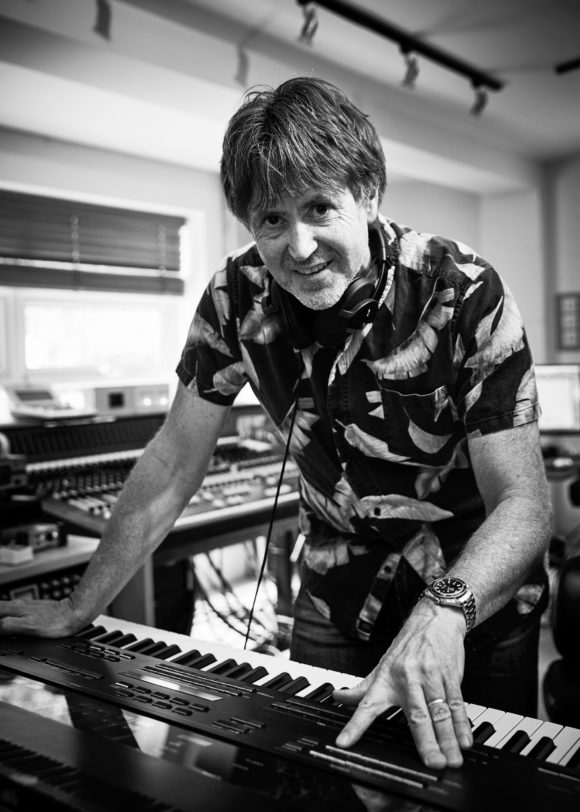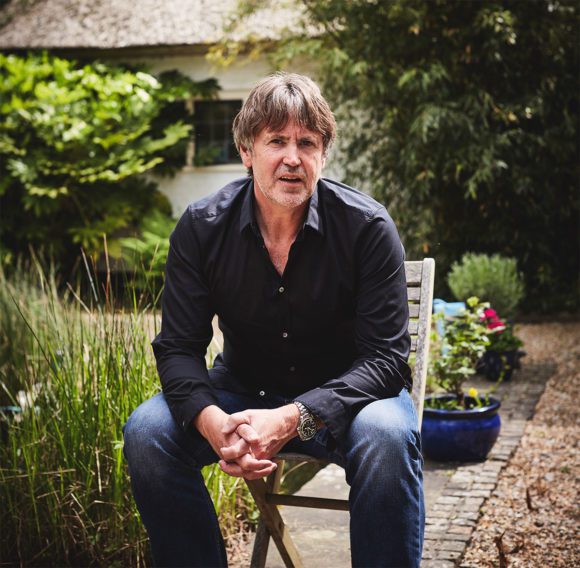Norbert:
We have read that you are actually still using hardware samplers like AKAI on tour today. Is it really like that? And if so, why?
Guy Fletcher:
No, not any more, they have officially been retired. I stuck with them for so long as they were very reliable but now I’m using computer based systems as the technology, reliability and sound quality has improved drastically.
Norbert:
And another rumor from the net – you auctioned off an old Jupiter 8. The buyer was certainly surprised to have caught such a prominent seller, right?
Guy Fletcher:
Yes, I did. I REALLY wish I hadn’t.
Norbert:
What has the buyer paid for it … and the most important question – is it still working?
Guy Fletcher:
I know it’s worth a lot more now and I would guess it is still working. It was actually the very first one in the UK.
Norbert:
Seems like you still have some of the vintage synths? Correctly?
Guy Fletcher:
Yes, the pride and joy is a Yamaha CS80. There’s also the GS-1, a Roland Juno 60, Roland Vocoder, Korg Wavestation, Vox Continental, Yamaha DX-1, DX7II a wurlitzer piano and a 1960 Hammond B3.
Norbert:
And do you still use them in the studio?
Guy Fletcher:
Yes, all the time. The CS80 is a bit problematic as it has a dry joint (somewhere) on one of the many hard-wired voice cards and one oscillator is quite out of tune. Needs some TLC!
Norbert:
Most of the time you are recording at British Grove Studios in London. What makes these studios so special?
Guy Fletcher:
Everything. British Grove is a remarkable facility. No expense was spared in its design and construction but the most important aspect is the 24 hour maintenance team headed by Graham Meek an ex-Decca engineer. This means that everything in the studio is perpetually functioning. If there is a fault with a microphone or piece of equipment, it will be repaired immediately with no interruption to the session. Also, Studio 2 is arguably the best mix room in Europe, if not the world. Just ask Glyn Johns. Oh, and the coffee is brilliant.
Norbert:
As a soloist you have also released some wonderful albums. What’s it like to produce your own stuff away from DIRE STRAITS? Where is the difference and the charm for you?
Guy Fletcher:
With my own productions, the joy is simply that I can do whatever I please and at my leisure. I enjoy all the processes in exactly the same way. i also really enjoyed creating the artwork myself. My wife, Laura is an artist so I had plenty of encouragement.
Norbert:
You have also worked with many other artists. Come on, you sure have some crazy stories in store. Do you want to entrust us with one?
Guy Fletcher:
There have been many interesting moments over the years in all the recording sessions I’ve been involved with. Most of them, unrepeatable! Here’s a few that I can tell you.
When we were in Montserrat, we had recorded a great take of a song we’d been working on all day. We had dinner and came back the next morning to listen and the tape would not play back. It was early digital tape, a faulty batch! The machine was the pioneering Sony 3324 digital multitrack and the song was Your Latest Trick. We shrugged our shoulders, accepted the idiosyncrasies of the new technology, went back in and played it again.
We used to have all sorts of problems with the Synclavier. It was once impounded by Customs in the former Yugoslavia when we rehearsed there for a Dire Straits tour. The specifications for the circuitry was of military spec. and the authorities considered it ‘missile technology’. It took a while before we got it back. Sometimes, I wish they had kept it because it always used to crash during the show and would take at least 30 seconds to reboot. Once It crashed before my keyboard intro to Tunnel Of Love and my keyboard tech was under my riser with his thumbs up whilst it was rebooting. He was confident it would work. As I lowered my hands to play the opening chords which had to happen at a certain point, it sprang to life with milliseconds to spare. The problems continued when we used it in the studio. Sometimes it would take all morning to boot up. Other days we gave up and went home. It was wonderful when it worked.
Working with Randy Newman in Los Angeles was a real experience too. Randy is an intensely funny guy and would make Mark and I laugh so much that our sides used to ache at the end of the day. Hence the term side-splitting. The Synclavier was used extensively on that album too. ‘The Land Of Dreams’.
Norbert:
What is your next project, Guy?
Guy Fletcher:
Once I finish work on Mark Knopfler’s new album, Mark and I will be continuing on with the Local Hero musical which is scheduled to hit the stage in 2019. Then we have a tour planned for Europe and the US. Meanwhile, I will be recording some of my own stuff and who knows what else may come along.








Beim Auftritt von Dire Straits beim Free-Mandela-Festival, das ich damals im Radio hören konnte, fielen mir besonders die Synthi-Sounds auf, die ich so bisher nicht von DS kannte. Jetzt weiß ich einiges mehr über deren Urheber, vielen Dank, auch wenn ich kein DS-Fan bin und Roxy Music ab dem 5.Album zu poppig wurde…
@Son of MooG Gebe Dir grundsätzlich recht, wobei auch „Avalon“ durchaus noch seine Momente hat. Und als davor „Flesh and Blood“ rauskam, lief die Scheibe bei mir auch rauf und runter. Aber die ist nicht so gut gealtert, wie ich finde. Wobei der Rolling Stone schon 1980 den Stab über dem Album brach: „Flesh + Blood is such a shockingly bad Roxy Music record that it provokes a certain fascination.“
müsste das nicht „from roxy music to dire straits“ heißen?
@arnimhandschlag Ich wollte nicht darauf hinweisen, sonst werde ich wieder von irgendwelchen Oxbridge-Absolventen belehrt, daß ich sowieso keine Ahnung habe, aber Du hast natürlich recht: „Until“ setzt eine Frist, „to“ spannt den Bogen vom Einen zum Anderen.
@iggy_pop Was hat sich unser Übersetzer nur dabei gedacht :-)
@Tyrell Keine Ahnung, was er gedacht hat, aber er hat einige, wenn auch kleine, Fehler fabriziert, wie z.B. „has“ statt „have“ und solche Sachen. Andererseits gibt es bei Amazona.de kaum einen Artikel ohne irgendwelche Fehler, warum sollte das bei einem englischen Artikel anders sein? Mich stört’s wenig; ab und zu mache ich mal eine Bemerkung, weil ich auch ein Klugscheißer bin…
@Son of MooG haha… Unser Übersetzer hat doch nicht von Deutsch ins Englische übersetzt, sondern vom Englischen ins Deutsche. Er kann also schlecht has und have verwechselt haben. Die Antworten von Guy wurden eins zu eins übernommen ;-). Wo hast du denn den Fehler gefunden. BTW, einen Übersetzer mit musikalischen Background können wir immer gebrauchen, vielleicht ist das was für dich?
@Tyrell Hallo Peter,
die Übersetzung / Übertragung ist gut. Brilliant übersetzt man allerdings nicht mit brilliant, sondern ausgezeichnet. Der Kaffee leuchtet ja nicht ;-) Bei Redewendungen lieber mal im OED gucken.
–
http://bit.ly/2eTWWVh
–
Zum anderen macht es immer noch einen Unterschied ob wir über britisch oder englisch reden. Insofern hat Nobert das gut gemacht. Could be worse.
@TobyB Hallo TobyB, das freut mich zu hören :-) Danke für dein Lob! Der Kaffee leuchtet nun nicht mehr und ist seit ein paar Minuten ausgezeichnet :-) Norbert
@iggy_pop @Iggy: Seit ich es als Lob empfinde, als Klugscheisser bezeichnet zu werden, fällt es mir viel leichter mich wie einer zu benehmen. Solltest du vielleicht auch mal probieren. Ah, Moment, tust du ja schon ;)
@arnimhandschlag Ich weiß zwar nicht, wer Du bist — und es interessiert mich auch nur wenig –, und an Dich dachte ich bei meiner Bemerkung auch nicht, aber da Dir der Schuh anscheinend paßt, zieh ihn Dir ruhig an.
.
Nach dem Klugscheißen das Lüften nie vergessen.
@arnimhandschlag Hallo Armin,
NOMEN est und so, siehe auch Terry Pratchett Die Schlacht der Nomen. :)